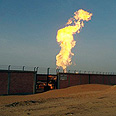
Israel prepares for Egypt gas halt
Electric Corp says will keep its power plants running after saboteurs blow up Egyptian pipeline that supplies natural gas to Israel, Jordan. Infrastructure minister: Incident proof we need to find alternatives, Israel pays Egypt twice as much as Jordan, Syria for gas
"The company's management will use all resources at its disposal to guarantee the continued orderly supply of electricity, including using other fuels in accordance with regulations and in cooperation with the Infrastructure Ministry and the Environment Ministry," the utility said in a statement.
Israel's infrastructure minister said the pipeline attack, the second in recent months, is proof the country needs to find alternatives to Egyptian gas.
Uzi Landau convened a press conference Wednesday to discuss the attack, and said that "the price Israel pays Egypt for the gas isn't low, it's twice as much compared to Syria, Jordan and Lebanon. The rate the Israel Electric Corporation pays the Egyptian gas company is identical to the rate it pays Israel gas suppliers."
Israel gets 40-45% of its natural gas from Egypt, a deal built on their landmark 1979 peace accord. It mostly uses coal for power generation but also has its own gas and can also substitute with diesel and fuel oil.
Ampal-American Israel Corp , an Israeli partner in the East Mediterranean Gas Co (EMG) that imports Egyptian gas to Israel, said the explosion was at a gas metering station 2 km from the town of el-Arish in northern Sinai and 30 km from EMG's terminal.
The station is owned by Gasco, the Egyptian gas transport company, which is a subsidiary of the Egyptian national gas company EGAS.
"Following the explosion EGAS has initiated its standard shut down procedure affecting gas transportation throughout the Sinai Peninsula and gas supply to Jordan, Lebanon, Syria; to major Egyptian industries and gas consumers in the Sinai; and to EMG," Ampal said in a statement.
"The extent of the damage to Gasco's metering station and the estimated repair period is unknown at this point."
Ampal's shares in Tel Aviv were down 13.5% at midday.
February attack
A similar attack on the same pipeline was staged on February 5 during an 18-day uprising that forced Hosni Mubarak from power on February 11. Gas supply resumed in March.
"There is still some gas in the pipes now which will be used but after that the electric company will have to deal with it," Infrastructure Minister Uzi Landau told Israel's Army Radio.
During the previous pipeline shut down, Israel boosted gas production at its off-shore Yam Thetis field, which already provides the country with most of its gas.
The discovery of two new off-shore fields – the Tamar site set to come online in 2013, and the larger Leviathan prospect expected to be ready around 2017 – have some officials saying Israel should stop Egyptian gas imports. Others say the competition is important to keep prices low.
Egypt on Saturday ordered its former energy minister and six other officials to stand trial on charges related to the natural gas deal with Israel. Opposition groups have long complained gas was being sold at preferential prices.
Landau denied below-market purchase prices, noting the price was raised a year ago. Ampal officials have said Israel pays Egypt more than any other country for its gas.
Asked what would happen if Egypt decided to cancel its gas deal with Israel, Landau said: "We are preparing for such a scenario by accelerating the connection of Tamar to Israel's gas pipes. This is supposed to happen in 2013, it will be able to fulfil all our needs.
Tani Goldstein contributed to this report
- Follow Ynetnews on Facebook










